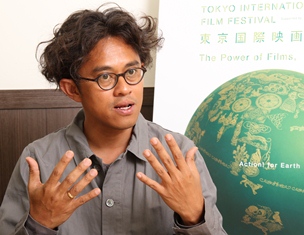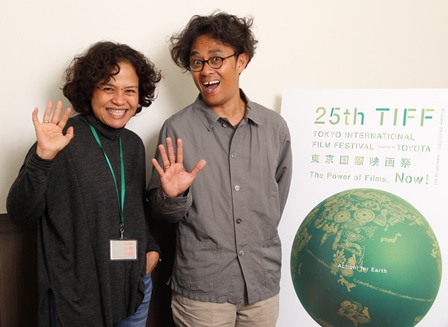Interview with Director Riri Riza (Atambua 39 ⁰Celsius)

This year’s TIFF is celebrating Indonesia cinema with six films by three prominent Indonesian directors: Garin Nugroho, Edwin, and Riri Riza. With a population of some 250 million, the country has a potentially strong domestic film industry, and not just for the usual martial arts and action genres. In fact, Riza’s “The Rainbow Troops,” which is playing in the Indonesian Express section, holds the domestic box office record with 4.6 million admissions, even though it is about marginalized people trying hard to realize their dreams. Compare that to the big Indonesian film of the year–at least overseas–the very violent crime thriller “The Raid,” which sold 2 million tickets in country.
Riza’s latest film and his ninth feature, “Atambua 39 ⁰Celsius,” is not in the Indonesian Express section but rather in the Competition section, even though the director says that he originally submitted it for consideration in the Winds of Asia-Middle East category. It’s not as commercial a film as the ones in the Indonesian Express section, and he admits that the audience may be more limited, given the theme. The movie is about the area in Indonesia that borders East Timor, which gained its independence via a referendum 12 years ago. As a consequence, many Timorese who thought the region should remain a part of Indonesia migrated west and became refugees in Indonesia. “Atambua 39 ⁰Celsius” looks at three of these refugees’ lives right now.
“It will be released in Indonesia November 8, on 20 screens,” Riza explains. “That’s a very limited release, only in big cities. I see the audience as mainly being university students. The main purpose is to stimulate discussion.”
The conflict in the story is mostly emotional. East Timor, also called Timor Leste, is now at peace, and there is no border violence any more. The problem for the three main characters–a man who belonged to one of the pro-Indonesian militias, his son, and a young woman the son befriended at a refugee camp–is their feeling of rootlessness in the Indonesian border town of Atambua. The son, Joao (Gudino Soares), has boxes of cassette tapes sent by his mother, who remained in Timor with his sisters. She encourages him to return but his father, Ronaldo (Petrus Beyleto), refuses to let him. Despite his wife’s reassurances on the tape that “if you return the police will protect you,” he is afraid to cross over, even for a visit. At the same time, he believes a “son should stick with his father.” Both remain in limbo, with no land or possessions. They hold dead-end jobs and Ronaldo drinks himself sick every night.
Riza says it’s a very real problem and one that rarely gets discussed in Indonesia. “That’s the poorest province in the nation,” he says. “It used to all be one land, one island, then the Portuguese came and there was a separation. Before there was a strong influence of Hinduism and Buddhism, but the Portuguese brought Catholicism. And then the Dutch came. The separations that occurred were not initiated by natives. It was a matter of colonization, and as often happens in former colonial areas, now the problem is poverty. The people who live there feel they’ve been left behind by greater Indonesia. They are oppressed by the realization that they have to deal with two countries now as Timorese. ‘That land over there used to be mine.’ To go there they have to have a passport, a visa. That’s too complex for someone like Ronaldo, who is just a bus driver.”
Which points to the other problem of ignorance. Joao and Nikia (Putri Moruk), the girl who returns to Atambua after a number of years living in the city to attend to the grave of her grandfather, stopped going to school at an early age. “The system hasn’t convinced them why they should go to school,” Riza explains. “You can make money driving a motorbike taxi, like Joao. Also, certain religious traditions discourage education. If you’re a Muslim you reach maturity when you can read the Koran; if you’re Catholic it’s when you receive communion. That’s enough, you’re an adult and ready to face the world. This is a common situation in poorer communities, and since the parents aren’t educated themselves, they party a lot. They like to go dancing and produce alcoholic drinks for their own consumption. There’s actually a tradition of partying, and the kids aren’t really inspired to learn about the world.”
In the movie’s most charged scene, Ronaldo is hanging out at a pool hall with friends. Drunk, they press him on whether or not he killed anyone during the violence surrounding the referendum. He refuses to answer verbally, preferring to use violence, instead, and lands in jail. “Ronaldo thought he had a stake in the nation, and opposed the referendum,” Riza says. “From 1999, when the referendum took place, and 2001 there were still conflicts on the border. Many people had guns. Finally, they agreed to give up their weapons to the government. They had this whole ceremony where guns were destroyed. But a couple of years ago I filmed a documentary in this area and discovered there are still strong political resentments.”
Though Riza uses many religious images in the movie, he’s quick to point out that Catholicism is not as oppressive as some might think. “That area has the highest percentage of Catholics in Indonesia, maybe 80 percent,” he says. “And Easter is the biggest festival of the year. But people still go about their daily lives. You can still work and open your store, and it’s the same in East Timor. There are no conflicts in this area, though in other regions of Indonesia there are sometimes problems between Christianity and Islam, which is the dominant religion in the country. For that matter, there are problems between different groups within Islam.”
As for the stories he tells in the movie, Riza says he got them from various sources, including documents and tapes compiled by refugee groups associated with the UN. Also, the actors who played his principal three characters are refugees themselves. “They had lots of anecdotes,” he explains. “The first five years were the most difficult. People want to see their parents, but they know if they take just one step into East Timor they could get killed, because they used to belong to a paramilitary group and people remember that. I got that story from the man who plays Ronaldo. The actor who played Joao, all his family actually emigrated from East Timor, but he still misses his childhood friends whose families belonged to the independence side.”

Riri Riza(Director/Screenplay)(right), Mira Lesmana(Producer)(left)
(Text by Philip Brasor)



















